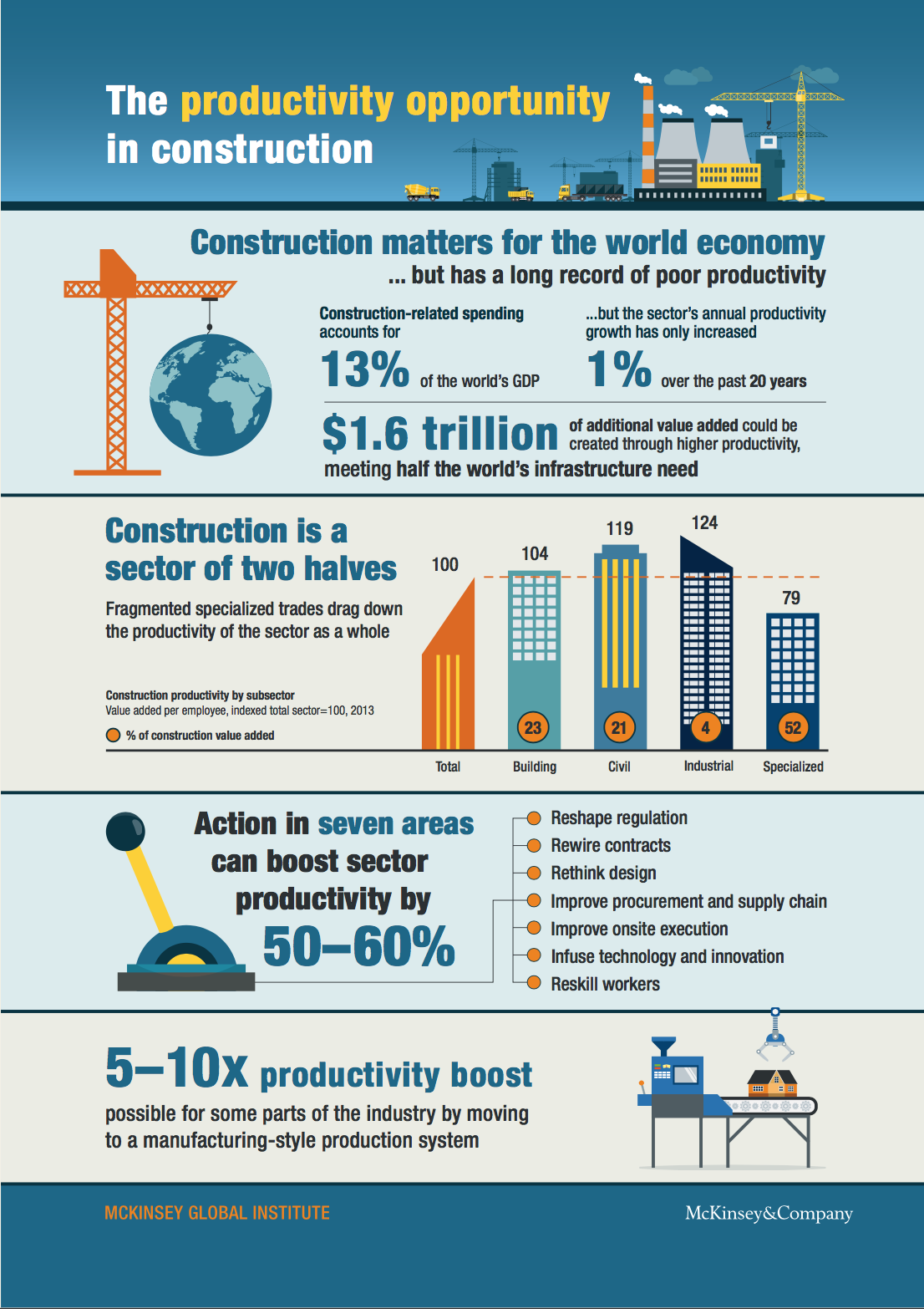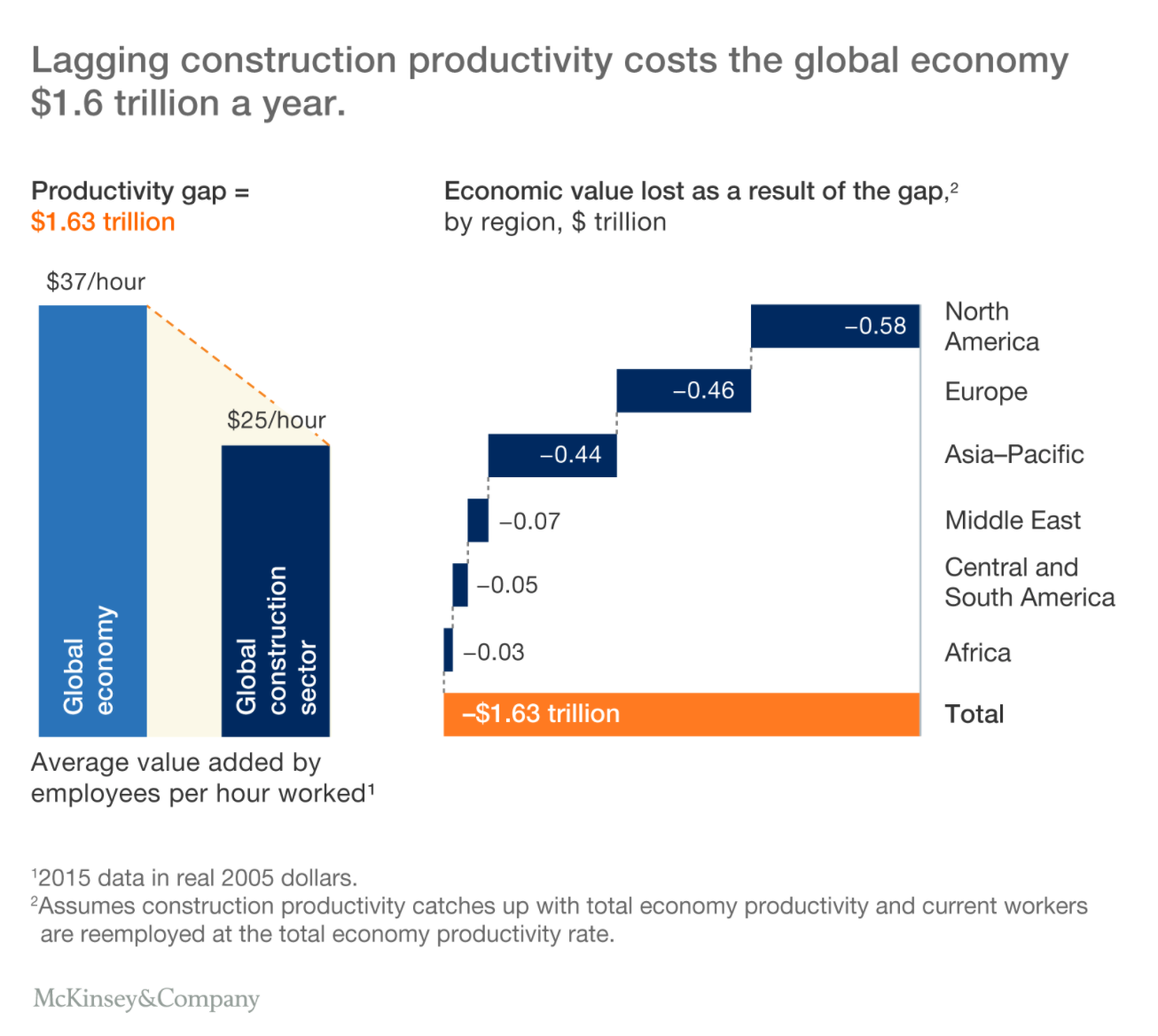Reinventing Construction
Greetings building science enthusiasts!
Miguel here waxing philosophical again for your leisure and edification. Recently the McKinsey Global Institute (a private think-tank dedicated to offering ideas to move the global economy forward) released a study outlining the state of the construction industry along with a set of forward-thinking solutions they see to increase productivity in the construction sector. The sheer scale of the report is remarkable, as should any globally applied perspective should be, and had some useful insights for those of us who think about the built environment.
I've outlined some of the resonant highlights herein. Let's begin with their infographic and get more granular from there.
Courtesy of McKinsey Global Institute
The Claims
Their premise begins with the somewhat startling fact that the construction sector, compared to the productivity of the rest of the global economy, is both stifled and laggard.
“Globally, construction sector labor-productivity growth averaged 1 percent a year over the past two decades, compared with 2.8 percent for the total world economy and 3.6 percent for manufacturing. In a sample of countries analyzed, less than 25 percent of construction firms matched the productivity growth achieved in the overall economies where they work over the past decade.”
It's important to note here that productivity is almost always never a good proxy for quality, but the causal factors of stifled productivity and poor quality may be shared. And while productivity remains a top priority for every industry, it is the humble opinion of this writer that continuing to argue that markets are naturally efficient as thinkers like Hegel have so staunchly done in the past, is a moot point. If you need proof, take a walk through a production grade subdivision sometime. Construction regulation was necessitated by the inefficiency and disorganization of the construction sector and its decreased focus on occupant (human) outcomes. We could get into the mire of detail regarding code and regulations and exactly how they "slow things down," but that argument is looking at the wrong end of the stick. If you're ever in Austin and up for a conversation over a beer, I'll explain the fallacies of.
The big thing to take away here is that this lapse in productivity is currently leaving a lot of money on the table. What's even more interesting to me is that there may be some profound insight into how we improve the quality of our built environment laid up behind the premise of "productivity is broken."
Let's find out.
“The new MGI Construction Productivity Survey confirms many reasons for this poor performance. The industry is extensively regulated, very dependent on public-sector demand, and highly cyclical. Informality and sometimes corruption distort the market. Construction is highly fragmented. Contracts have mismatches in risk allocations and rewards, and often inexperienced owners and buyers find it hard to navigate an opaque marketplace. The result is poor project management and execution, insufficient skills, inadequate design processes, and underinvestment in skills development, R&D, and innovation.”
This rings true. Each new degree of fragmentation in the construction industry is one more opportunity for miscommunication and potentially poor delivery. We see it all the time and that's why we're so insistent on integrated design and integrated project delivery. It's the most immediate way to bridge the gap and deliver truly high quality.
The study goes on to suggest that there are ways to improve the productivity and, if done with the right kind of thinking, I posit will improve quality at scale as well.
Breaking Down The Proposals
“Examples of innovative firms and regions suggest that acting in seven areas simultaneously could boost productivity by 50 to 60 percent. They are: reshape regulation; rewire the contractual framework to reshape industry dynamics; rethink design and engineering processes; improve procurement and supply-chain management; improve on-site execution; infuse digital technology, new materials, and advanced automation; and reskill the workforce. Parts of the industry could move toward a manufacturing-inspired mass-production system that would boost productivity up to tenfold. Industrial and infrastructure megaprojects need to instill holistic project-operating systems on-site and in design of offces. The highly non-linear and challenging nature of megaprojects underscores the difficulty of, and necessity for, moving toward an industrialized project-operating system.”
Bringing this down to the residential level, I think they're 100% on the mark here with regard to improved productivity and improved quality. Here's the list of their proposed broad stroke changes across the industry for your convenience, along with my brief comments of what each could look like from a localized perspective (be the change you wish to see in the world, right?).
Reshape Regulation
This is obviously complex and any pithy answer won't fully satiate everyone, but the trends are obvious. There are non-prescriptive standards out there, like the PHIUS+ 2015 Standard, that are almost entirely outcome focused. If this is not obvious, I'm telling you it should be.
In Austin we've got the Austin Green Building Program, which was a pioneer program and did a lot to move the market here toward a more outcome based approach, but there's still a lot left on the table - especially in regards to the considerations of indoor air quality and energy use. To the builders and architects simply intent on moving product quickly to turn profit, programs like these are a hindrance and that's a big problem when you're talking about industry shifts.
Something has to change and education is the most powerful tool that regulatory bodies can use to communicate financial benefits as well as human-based outcomes. Reshaping regulation is a lofty goal, but MGI is right in pointing out its necessity.
Rewire The Contractual Framework To Reshape Industry Dynamics
Contracts are a big deal. There are great legal thinkers like Joe Basham of Allensworth & Porter, LLP. who are on the leading edge of making industry change through better contract processes and improved negotiating communications. As an industry, we need to think about how we can move toward better outcomes and thus less litigation. There is ample opportunity to get things right in delivery and contracts make a big difference in how the built environment is delivered.
Rethink Design And Engineering Processes
There is more to say here than any of us have time for. Just look at our company, its mission, and by virtue of its existence, the very industry shift we're trying to facilitate. Of course we're focused on the residential market, but there is much to say about how MEP engineers can profoundly change health outcomes of projects if only they'd engage architects earlier and better and stick around through the CA process to ensure things are done well. The same can be said of architects willingness to rely on their consultants' expertise as a means of delivering better projects and building brand strength.
Improve Procurement And Supply-Chain Management
This is easy to say and vastly complex and difficult to pull off. Just ask any HVAC distributor about it and you'll most likely get an ear-full of creative ideas that get lost in the shuffle of manufacturers' corporate business pacing. Much of the supply-chain management can be consolidated with panelized processes, which we're seeing more and more of with the tiny-house movement.
Improve On-Site Execution
I can't see any other way to qualify this one except demanding honest, thorough, and quality work. Project managers need to establish the right kinds of feedback loops and inspection protocols to make certain their jobs are being delivered the right way. The study goes on to bring up a few pieces of software and throws out some jargon straight out of the Harvard Business Review, but the bottom line is that quality construction is not accomplished when processes are top heavy. We need experienced and intelligent on-site management to build a better world and it's up to construction firms to be forward thinking about their own processes.
Also, the better the project is planned and engineered, the better the delivery can be. That should be obvious.
Infuse Digital Technology, New Materials, And Advanced Automation
They really nailed this one. I'll simply quote them because they did such a good job.
"Companies can start by making 3D building information modeling (BIM) universal within the company alongside use of digital collaboration tools, drones, and unmanned aerial vehicles for scanning, monitoring, and mapping. They can put themselves at the cutting edge by using platforms such as 5D BIM to establish transparency in design, costing, and progress visualization; advanced analytics enabled by the Internet of Things to improve on-site monitoring of materials, labor, and equipment productivity; and digital collaboration and mobility tools (such as construction management apps loaded on mobile devices) to better track progress and collaborate in real time. On-site productivity can be increased by as much as 50 percent by implementing a cloud-based control tower that rapidly assembles accurate data in near real time that is both backward- looking and predictive (for example, using plan conformance and other variability and inventory metrics). Importantly, owners need to ensure that the right data ow through the various owner, contractor, and subcontractor systems. Big data also has a significant role to play. Techniques and data that are readily available today can produce large improvements in the accuracy of cost and schedule estimates as well as engineering productivity. Developing new lightweight materials and construction methodologies such as prefabricated pre- finished volumetric construction can further facilitate off-site fabrication. Advanced automated equipment and tools such as bricklaying and tiling robots can accelerate on-site execution. The introduction of predictive analytics and pattern recognition has enabled far more sophisticated monitoring of construction projects; one example is the network of sensors installed to track the impact of tunneling works for London’s Crossrail project. MGI’s productivity survey indicated that the biggest barriers to innovation by construction companies are underinvestment in IT and technology more broadly, and a lack of R&D processes. Establishing innovation of officers can make a difference for technology adoption."
The big caveat here is that in a vacuum, this piece of the puzzle is useless. We need integrated project teams to pull any of this off. Revit is a big deal for us, but without good project team integration it would be useless.
Reskill The Workforce
Again, they summarized this one nicely.
"Change in the construction sector cannot be achieved without investment in retooling a workforce that is aging and changing its makeup through migration. Construction firms and workers need to continuously reskill and train to use the latest equipment and digital tools. In the mix should be apprenticeship programs such as the one run by Siemens in the United Kingdom, training frontline workers in core skills that are currently underdeveloped; and increasing stability in the workforce by breaking seasonality and cyclicality."
If you're not learning, you're not growing. And to say "Son, I've been doing this for 30 years" is absolutely not a credential when the fundamental building physics have changed so much in that time-span.
Wrapping Up
Overall, this was a really excellent and insightful study. My biggest disappointment is that their metrics do not look at quality of the built environment as much of a metric of progress as productivity. Of course I'd love to see mention of passive house degrees of progress as their end-goal, just like many of us are pushing for here with Passive House Austin. HOPEFULLY the proposals they've laid out, if achieved, have the unintended side-effect of quality. Regardless, the study is thought-provoking and is a great reminder of how big our role is in the global economy as actors in the AEC industry. What we do has serious implications world-wide.
As thinkers in the industry it's important to stay on the forefront of where things are headed. We'll continue to bring you digested thoughts on studies just like these.


